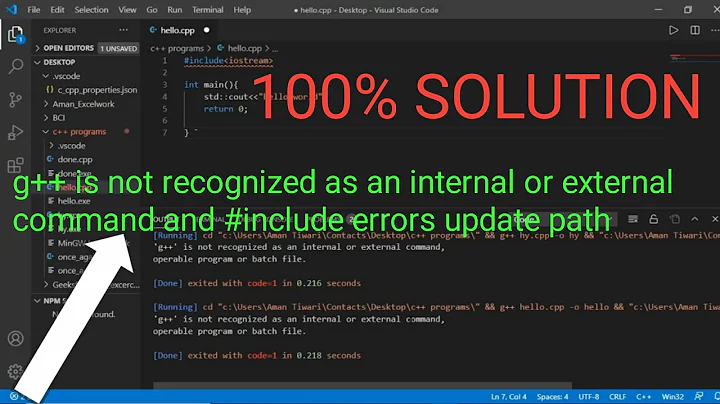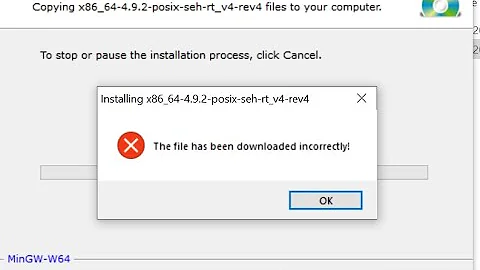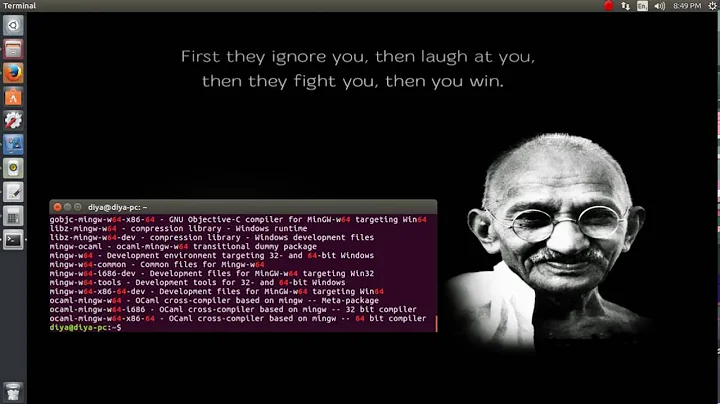MinGW g++ doesn't find headers in its own include directory
Solution I came up with: based on Michael Burr's comment above I ran the compiler with the verbose flag. For some reason, the include directory that is searched is not located in the MinGw root directory, but buried in the lib directory. I expect that this was intended to be fixed with one of the installation scripts, but I either didn't run it correctly or it didn't work on my system. The directory where I needed to add the relevant files is, on my machine,
C:\MinGW\lib\gcc\x86_64-w64-mingw32\4.8.2\include
This is a quick-and-dirty fix. I'm sure that there's a better way, but this got me up and running the quickest.
Related videos on Youtube
Comments
-
 tjtoml almost 2 years
tjtoml almost 2 yearsSo I recently installed MinGW via the latest version of nuwen's MinGW distribution that includes the boost C++ libraries. Specifically, I was after the scoped_ptr that the boost library provides. However, when I try to include the scoped_ptr (
#include <boost/scoped_ptr.hpp>) in my header, the compiler throws
error: boost/scoped_ptr.hpp: No such file or directoryMakefile:
compile: g++ -o gen/cavestory src/**.cc run: gen/cavestoryAlso, I added a back version of SDL to MinGW's include directory under SDL/**. All of the header files are there, I've checked, and the compiler throws a similar error on my
include SDL/SDL.h>.Things I've tried:
Every variation of<>and""in my include statements
Removing the.hand.hpp
Setting the compiler flags to specifically search the directories containing the headers withg++ -IThis code was compiling with an earlier version of MinGW, and the author of the MinGw distrobution specifically states that he changed the g++ compiler options to default to C++11, so I think it's very likely that it's something to do with that. My google-fu has not yeilded results, though.
-
Rapptz about 10 yearsYour mingw might be getting shadowed.
-
Michael Burr about 10 yearsCreate an empty
empty.cfile, then issue the command:gcc -v empty.c. Paste the output into your question. Included in the spew will be the directories that the compiler will search for include file in. Assuming you've installed the nuwen distro intoc:\mingw,scoped_ptr.hppshould be in `c:\mingw\include\boost` -
Michael Aaron SafyanTry "which g++" in the make file to figure out which is getting invoked. By the way, you shouldn't be hard-coding "g++" in your Makefiles. This is bad form. Please see: sites.google.com/site/michaelsafyan/software-engineering/…
-
-
Michael Burr about 10 yearsAh-ha - I've been running the
set_distro_paths.batscript to set the path to MinGW's executables. Little did I know it also adds (or sets) a couple directories, such asc:\mingw\includeto theC_INCLUDE_PATHandCPLUS_INCLUDE_PATHenvironment variables. That's what gets boost and friends. I thought thatset_distro_paths.batonly set the path. -
Michael Burr about 10 yearsAlso, it's interesting/weird that using the
-Ioption didn't get things working for you. Maybe you specified-I c:\mingw\include\boostinstead of just-I c:\mingw\include? -
 tjtoml about 10 yearsI tried both. I'm now slamming my head against the linker not being able to locate SDL.lib and SDLMain.lib. I'm getting undefined reference to every SDL_* call
tjtoml about 10 yearsI tried both. I'm now slamming my head against the linker not being able to locate SDL.lib and SDLMain.lib. I'm getting undefined reference to every SDL_* call -
Michael Burr about 10 yearsYou might want to post the
-voutput in your question. Also, keep in mind that since release 11.0, nuwen's MinGW is x64 native (it defaults to building x64 targets - I think that it doesn't even support the-m32option to build a 32-bit target), so make sure any libraries you're adding to your build are also x64. If you've installed 32-bit SDL libs that could be a reason for undefined references, since some name mangling rules for x86 and x64 are different.


![How to install MinGW w64 on Windows 10 [2022 Update] MinGW GNU Compiler for C & C++ Programming](https://i.ytimg.com/vi/WWTocqPrzMk/hq720.jpg?sqp=-oaymwEcCNAFEJQDSFXyq4qpAw4IARUAAIhCGAFwAcABBg==&rs=AOn4CLD45ea8Oys-qc3gnircQLkfe3MeVQ)




![How to install MinGW -w64 on Windows 10/11 [2022 Update] MinGW GNU Compiler for C & C++ Programming](https://i.ytimg.com/vi/8Jc26cmTtKM/hqdefault.jpg?sqp=-oaymwEcCOADEI4CSFXyq4qpAw4IARUAAIhCGAFwAcABBg==&rs=AOn4CLDsp6oIY9lujQpTSn1Ky5Wvg3v1Og)




